Jewish History: Antisemitism
Jewish Migrations to the United States in the Late Twentieth Century
Jewish Mothers of the Plaza de Mayo
The Jewish women who formed part of the Mothers of the Plaza de Mayo were pivotal to the human rights movement in Argentina, fighting for truth and justice for victims of the 1976-1983 dictatorship that resulted in 30,000 disappeared, tortured, and killed.
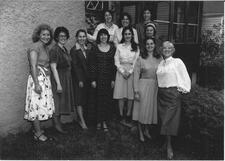
Women, Music, and Judaism in America
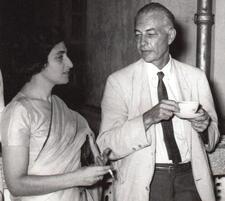
Ruth Prawer Jhabvala
Ruth Prawer Jhabvala was a novelist, short story writer, and two-time Academy Award-winning screenwriter. Known for her nuanced depiction of exile and identity, she is the only person to have won both a Booker Prize and an Oscar.
Anna Maria Jokl
Author, psychoanalyst, and scriptwriter Anna Maria Jokl was greatly influenced by the many places she lived: Vienna, Berlin, Prague, London, Zurich, and Jerusalem. Forced to flee countries twice because of Nazism, Jokl is best known for her German children’s books. Her prolific career includes accomplishments in radio broadcasting, psychoanalytic writing, and autobiographical prose.
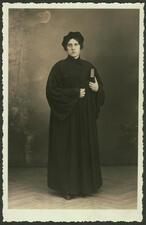
Regina Jonas
Regina Jonas longed to become a rabbi for most of her life, and despite significant obstacles, was ordained in 1935. As the first ordained female rabbi, she worked in Berlin until her deportation to Theresienstadt, where she continued to preach, teach, and inspire her fellow inmates until her final deportation to Auschwitz.
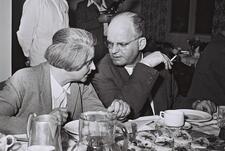
Senta Josephthal
Senta Josephthal was German-born Zionist activist who was particularly influential in the kibbutz movement. She trained and recruited young Germans to the movement and represented the kibbutz movement in national organizations and political arenas after emigrating to Palestine.
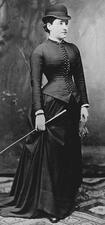
Juedischer Frauenbund (The League of Jewish Women)
Founded in 1904, The League of Jewish Women pursued secular German feminist goals while maintaining a strong sense of Jewish identity. The League supported vulnerable women through practical social reforms while fighting for political power within the German Jewish community. It saw employment opportunities as essential to women’s economic, psychological, and emotional independence.
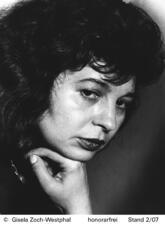
Mascha Kaléko
Mascha Kaléko was a German-Jewish poet whose literary works have made her a mainstay of the German poetic cannon. She is best known for content, diction, rhythm, and Kalékoesque rhyme.
Régine Karlin-Orfinger
Régine Karlin’s resistance activities would alone have warranted esteem and recognition, but she did not desist from further work. Totally bilingual in French and Dutch and even polyglot, since she was also proficient in both English and Russian, she had a brilliant career as a lawyer, characterized by her militant and unwavering support of causes that she considered just.
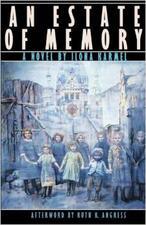
Ilona Karmel
Ilona Karmel transformed details of her experiences as a Polish-Jewish prisoner in Nazi work camps and as a patient undergoing a prolonged convalescence into two compelling and memorable novels. Karmel was a distinguished writer, winning a fiction contest from Mademoiselle and teaching awards from the Massachusetts Institute of Technology.
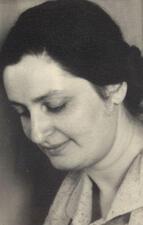
Hannah Karminski
During the mid-1920s and the 1930s in Germany, Hannah Karminski served as secretary of the League of Jewish Women and, from 1924 to 1938, as editor of its newsletter. After the forced liquidation of the League in 1938, Karminski remained in Germany and continued her work in the Reich Association of Jews in Germany, assisting with the kindertransports and welfare. She was deported to Auschwitz and murdered in 1942.
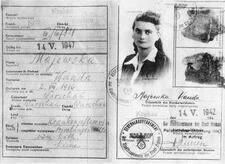
Kashariyot (Couriers) in the Jewish Resistance During the Holocaust
Kashariyot were young women who traveled on illegal missions for the Jewish resistance in German-occupied Eastern Europe during the Holocaust. They smuggled goods, news, and other Jews in and out of the ghettos of Poland, Lithuania, and parts of Russia. While those who fought the Germans within the ghettos are often most celebrated for their heroism, kashariyot were essential in the survival of Jews within ghettos.
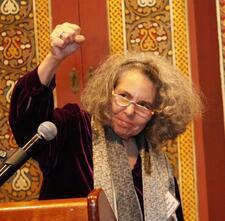
Melanie Kaye/Kantrowitz
Melanie Kaye/Kantrowitz (1945-2018) was a lesbian-feminist writer and editor. She made multiple theoretical contributions to understanding Judaism, lesbianism, and feminism as intersectional identities, extended an awareness of class and economic justice through a Jewish lens, and made visible racial differences within Jewish communities. She advocated Radical Diasporism as a progressive alternative to Zionism.
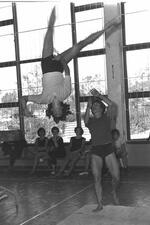
Agnes Keleti
In 1944, when the Germans invaded Hungary, gymnast Agnes Keleti bought fake identification papers and carried the bodies of the dead to mass graves during the battle of Budapest. After the war, she returned to gymnastics; her career highlight was the 1956 Olympics, where 35-year-old Keleti won many medals, including four gold for uneven parallel bars, balance beam, floor exercise and combined exercise-team.
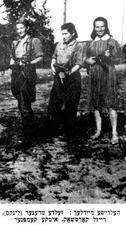
Vitka Kempner-Kovner
Vita Kempner-Kovner was a heroic fighter on the front lines of the underground resistance to the Nazis.
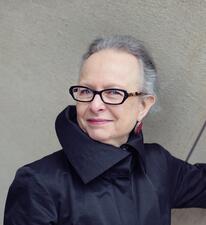
Barbara Kirshenblatt-Gimblett
Barbara Kirshenblatt-Gimblett is an American folklorist who is a scholar of Jewish cultures of Eastern Europe, North America, and Israel, museums, heritage, and tourism, as well as a curator of exhibits and documentarian. She is Chief Curator of the core exhibit of the POLIN Museum of Jewish history in Warsaw.
Ruth Kisch-Arendt
Ruth Kisch-Arendt, an Orthodox Jew, became one of Germany’s foremost performers of lieder (nineteenth–century allegorical poems set to music)through the intense period of anti-Semitism leading up to the Holocaust. After World War II, Kisch-Arendt used her talents to highlight great Jewish composers.

Gerda Weissmann Klein
Holocaust survivor Gerda Weissmann Klein has used her experiences to educate countless people through her books, television appearances, and motivational speaking. Among numerous other awards for her work, Klein was appointed to the United States Holocaust Commission by President Clinton in 1997, and in 2011 she was awarded the Presidential Medal of Freedom by President Obama.
Traute Kleinova
Gertrude “Traute” Kleinová was a Czechoslovakian table tennis player. Noticed at a young age for her athletic ability, she later defeated the reigning world champion in 1935 and went to the World Championships in London. During the war, Kleinová was deported to Theresienstadt and then Auschwitz but she survived and emigrated to the United States.
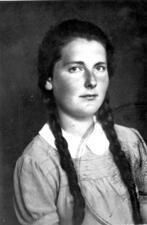
Bronia Klibanski
Bronia (Bronka) Klibanski was one of the heroic Kashariyot (couriers) of the Jewish resistance during the Holocaust. She became the primary kasharit for the Dror Zionist group in 1943, obtaining critical weapons for the Bialystok ghetto revolt, gathering intelligence, rescuing other Jews, and saving the secret archive of the ghetto.
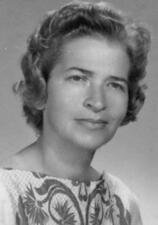
Reizia Cohen Klingberg
Reizia Cohen Klingberg began her career as a teacher, but when she began hearing reports of deportations and disappearances, she returned to occupied Krakow in 1942 and joined the ghetto’s underground movement. The group stole and smuggled weapons and attacked German officers. Despite being betrayed, arrested, and deported, Klingberg survived to be liberated by American soldiers at Auschwitz and subsequently moved to Palestine.
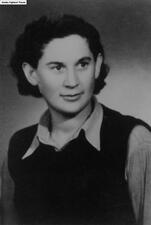
Chajka Klinger
Chajka Klinger, a member of Ha-Shomer ha-Za’ir, was active in the resistance against the Nazis in Bedzin and Warsaw. Her mission was to live, so that she could keep the flame and memory of resistance alive. Her diaries were the first written evidence about the Warsaw Ghetto uprising to escape Nazi Europe.
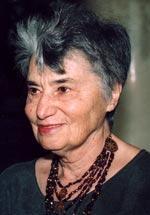
Ruth Klüger
A Holocaust survivor from Vienna (1931-2020), Ruth Klüger emigrated to the United States in 1947 and pursued a career in academia. Her German-language autobiography weiter leben: Eine Jugend (1992) revealed her personal experience of the Holocaust to the public, establishing her as one of the leading public intellectuals on the Holocaust in Austria and Germany.
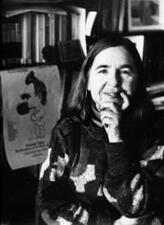
Sarah Kofman
Sarah Kofman was a French Jewish philosopher and professor who published many books on Freud, Nietzsche, Rousseau, and more.


